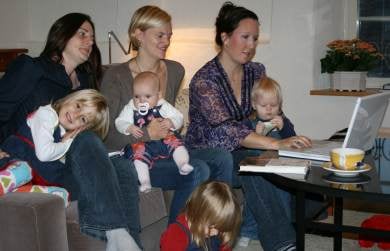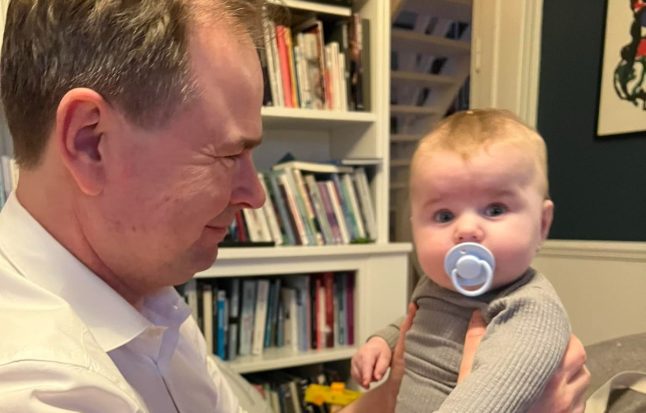Sweden’s generous parental leave is notorious for having spawned a growing tribe of latte mamas, clogging up cafés with unwieldy prams and generally getting in the way of the childless masses. They are a much-maligned breed to be sure. But perhaps one shouldn’t always be so quick to judge. The Local recently caught up with three American women in Stockholm who, far from discussing designer diapers, were dedicating much of their maternity leave to raising awareness about the ongoing conflict in Darfur.
When we meet – at a café, of course – Cristina Ljungberg, Selina Millstam and Leslie Maunsbach have all temporarily shed their kids. But this is not normally a luxury they can afford. With a child in one hand and a mobile phone in the other, the mothers have been making use of every free second to line up a series of events aimed at keeping the atrocities being perpetrated in the Sudanese region at the forefront of public awareness.
“Our meetings have been at parks, during power walks around Djurgården, over fika in a coffee house, always with a few babies around. It has been unconventional to say the least,” says Selina Millstam, a leadership trainer currently nursing a four-month old daughter.
Among their many other activities, the women have been liaising with the Liberal Party’s foreign policy spokeswoman, Birgitta Ohlsson, about the possibility of organizing a Darfur-related breakfast meeting and film-viewing at the Swedish parliament. Ever since she visited refugee camps in Darfur in 2004, Ohlsson has been calling for more extensive intervention in the region.
“What these women are doing is very important,” she tells The Local. “Sweden, and everyone else for that matter, needs to do a lot more.”
The mothers’ first became involved in the project after one of their number, Cristina Ljungberg, had her eyes fully opened to the extent of the carnage in Darfur by a girlfriend in the United States. Ljungberg listened open-mouthed to stories about her friend’s brother, Brian Steidle, a former US Marine Captain who travelled to Darfur in 2004 as an official military observer for the African Union. Having witnessed a seemingly endless string of horrors, Steidle eventually became frustrated by the inaction of the international community and resigned from the Marine Corps. On his return to the United States he turned his attentions to exposing the systematic destruction of an entire region and its people.
Though already busy running a city centre art gallery and raising two young sons, Cristina Ljungberg was jolted into action by the stories she heard.
“I immediately knew I had to get involved somehow. I didn’t even have a choice,” she says.
Despite having no previous knowledge of film-making, Ljungberg ended up helping to produce The Devil Came On Horseback, a critically acclaimed documentary movie which, according to the New York Times, “demands to be seen as soon as possible and by as many viewers as possible.”
With three daughters – a pair of four-year old twins and their two-year-old sister – Leslie Maunsbach helps bring the group’s kid count up to six. Like Ljungberg, she too runs her own business yet somehow finds time to coordinate Darfur-related events.
“We are living such a fortunate life in Sweden, and I would like to help others who haven’t had the opportunities or luck that we have had since birth. Now as a mother, images of children in the Sudan who are victims of poverty and genocide strike even harder to my heart,” she says.
This is a point to which they all return: the realization that if their children are to live in a better world, they as parents need to be prepared to put in the spadework.
As far as the Darfur project is concerned, their labours have already been rewarded. After countless phone calls and e-mails, punctuated by lullabies and daycare pick-ups, the Nordic Human Rights Convention eventually agreed to screen The Devil Came on Horseback at its conference in Stockholm on November 19th. The women have also arranged for the powerful Darfur/Darfur photo exhibit to be displayed at the conference.
Brian Steidle is then flying to Stockholm to attend two events organized by the mothers’ group. First he will answer questions at the official Swedish premiere of The Devil Came on Horseback on November 20th before reading excerpts from his book the following evening.
The group, which has grown to include “around a dozen women (and one man)”, has also won over Sweden’s national broadcaster – SVT has cleared a slot to screen Steidle’s movie at the end of the month.
Far from the call of the mocha, the mothers stress the importance of direct citizen action and the need to keep putting pressure on politicians, as well as companies operating in conflict regions.
“We all have a responsibility. Really Sweden needs to stand up in the UN and say that this is genocide and it needs to be stopped,” says Selina Millstam.
Upcoming events:
November 20th, 7pm The Devil Came on Horseback, movie premiere at the Park cinema, Sturegatan 18. Includes Q & A session with Brian Steidle. A limited number of tickets for the event can be purchased by emailing [email protected] or dropping in to New York Stories bookstore, Odengatan 100, Stockholm.
November 21st, 7pm Brian Steidle reads from his book, The Devil Came on Horseback, at Tidnings- och tidskriftsbiblioteket, Odengatan 59. Free of charge.
November 26th, 10pm. SVT1 screens The Devil Came on Horseback.



 Please whitelist us to continue reading.
Please whitelist us to continue reading.